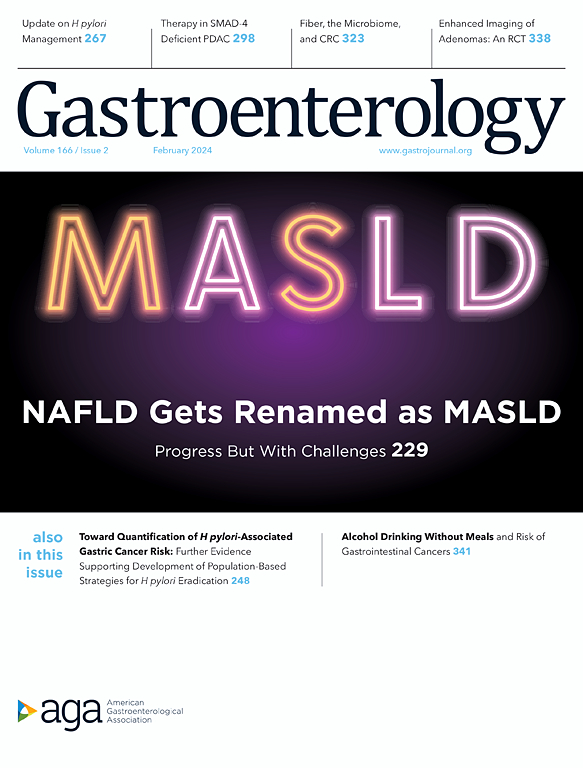Dietary fiber modulates the window of susceptibility to Clostridioides difficile infection
IF 25.7
1区 医学
Q1 GASTROENTEROLOGY & HEPATOLOGY
引用次数: 0
Abstract
Background & Aims
Clostridioides difficile epidemiology is rapidly evolving, and understanding the factors that contribute to one’s risk of C. difficile infection (CDI) is urgently needed. Based on our observations in a dietary intervention study, we hypothesized that fiber modulates susceptibility to C. difficile post-antibiotic exposure and investigated this using human specimens and murine models.Methods
To determine whether fiber impacts factors known to mediate colonization resistance against C. difficile, we investigated bile acid and microbiota composition in human subjects on a low-fiber diet. To directly test the impact of a fiber-free diet on CDI susceptibility, we treated mice with fiber-rich or fiber-free diets and quantified CDI susceptibility after antibiotic use, as well as characterized alterations in both bile acid and microbiota composition.Results
A low-fiber diet leads to increased fecal primary conjugated bile acids in humans, including bile acids known to promote C. difficile colonization such as taurocholic acid (TCA). Using a novel mouse model of CDI, we show that a fiber-free diet leads to prolonged and increased susceptibility to CDI that is associated with alterations in bile acids. We further report long-lasting perturbation to the microbiota, highlighted by depletion of commensals known to promote colonization resistance against C. difficile.Conclusions
Consumption of a low-fiber diet after antibiotic use contributes to a prolonged susceptibility to CDI that corresponds to a perturbation in both microbiota and bile acid composition. These results suggest that in the context of antibiotic treatment, diet is a critical, modifiable risk factor for CDI susceptibility.膳食纤维调节艰难梭菌感染的易感性窗口期
背景,艰难梭菌流行病学正在迅速发展,迫切需要了解导致艰难梭菌感染(CDI)风险的因素。基于我们在饮食干预研究中的观察,我们假设纤维调节抗生素暴露后对艰难梭菌的敏感性,并使用人类标本和小鼠模型进行了研究。方法为了确定纤维是否影响介导艰难梭菌定植抗性的已知因素,我们研究了低纤维饮食的人类受试者的胆汁酸和微生物群组成。为了直接测试无纤维饮食对CDI易感性的影响,我们用富含纤维或无纤维饮食治疗小鼠,并量化抗生素使用后CDI易感性,以及表征胆汁酸和微生物群组成的变化。结果低纤维饮食导致人类粪便初级结合胆汁酸增加,包括已知促进艰难梭菌定植的胆汁酸,如牛磺酸胆酸(TCA)。使用一种新的CDI小鼠模型,我们发现无纤维饮食导致CDI易感性延长和增加,这与胆汁酸的改变有关。我们进一步报告了对微生物群的长期扰动,突出显示了已知促进对艰难梭菌定植抗性的共生菌的消耗。结论:抗生素使用后低纤维饮食有助于延长对CDI的易感性,这与微生物群和胆汁酸组成的扰动相对应。这些结果表明,在抗生素治疗的背景下,饮食是CDI易感性的一个关键的、可改变的危险因素。
本文章由计算机程序翻译,如有差异,请以英文原文为准。
求助全文
约1分钟内获得全文
求助全文
来源期刊

Gastroenterology
医学-胃肠肝病学
CiteScore
45.60
自引率
2.40%
发文量
4366
审稿时长
26 days
期刊介绍:
Gastroenterology is the most prominent journal in the field of gastrointestinal disease. It is the flagship journal of the American Gastroenterological Association and delivers authoritative coverage of clinical, translational, and basic studies of all aspects of the digestive system, including the liver and pancreas, as well as nutrition.
Some regular features of Gastroenterology include original research studies by leading authorities, comprehensive reviews and perspectives on important topics in adult and pediatric gastroenterology and hepatology. The journal also includes features such as editorials, correspondence, and commentaries, as well as special sections like "Mentoring, Education and Training Corner," "Diversity, Equity and Inclusion in GI," "Gastro Digest," "Gastro Curbside Consult," and "Gastro Grand Rounds."
Gastroenterology also provides digital media materials such as videos and "GI Rapid Reel" animations. It is abstracted and indexed in various databases including Scopus, Biological Abstracts, Current Contents, Embase, Nutrition Abstracts, Chemical Abstracts, Current Awareness in Biological Sciences, PubMed/Medline, and the Science Citation Index.
 求助内容:
求助内容: 应助结果提醒方式:
应助结果提醒方式:


